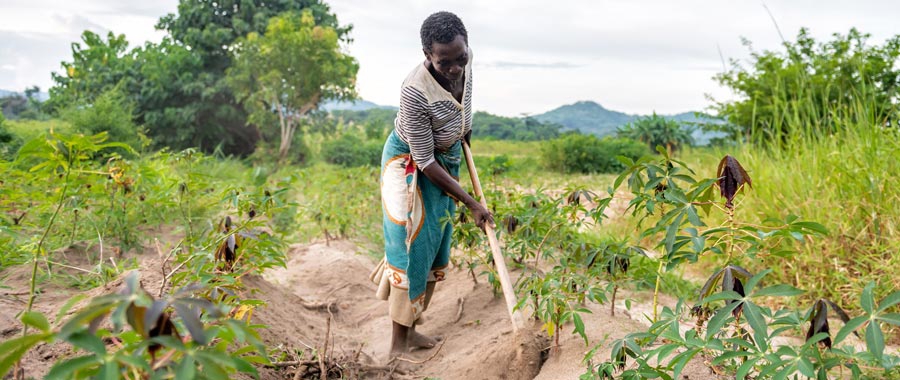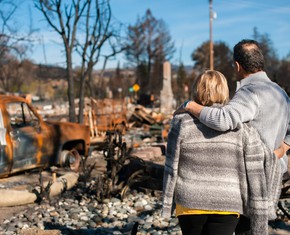The views expressed in our content reflect individual perspectives and do not represent the authoritative views of the Baha'i Faith.
I have worked in agricultural development and agricultural extension in South Africa for four decades, and I’ve learned something profound: it’s the farmer, not the farm.
I started in the arid plains in North-western South Africa, hanging on the edge of the Kalahari, where I attempted to apply university training in Agricultural Business together with my expanding understanding of the Baha’i teachings on agriculture and development.
Two of the most oft-cited passages in this connection come from Abdu’l-Baha:
The question of economics must commence with the farmer and then be extended to the other classes inasmuch as the number of farmers is far greater than all other classes. Therefore, it is fitting to begin with the farmer in matters related to economics for the farmer is the first active agent in human society. – Abdu’l-Baha, from a tablet to an individual Baha’i, October 4, 1912.
First and foremost is the principle that to all the members of the body politic shall be given the greatest achievements of the world of humanity. Each one shall have the utmost welfare and well-being. To solve this problem we must begin with the farmer; there will we lay a foundation for system and order …. – Abdu’l-Baha, The Promulgation of Universal Peace, p. 312.
Note that Abdu’l-Baha did not say we must commence or begin with the farm. He deliberately said to begin not with the farm, but with the farmer – with the human being that lies behind the entire agricultural industry upon which so much of any economy rests, and upon which all humans base their sustenance.
I grew up in Hollywood, amidst a family of movie actors and entertainers. I happened upon this advice about farmers as a Baha’i youth, and it inspired me to study agriculture. Ever since I was five years old, I knew I would someday live in Africa – hopefully in service to bettering the lot of the African people. Agriculture would get me there. But, being an average person and, then, of little experience, I, like so many others in my field, equated the farmer with the farm. So, I, like so many others, studied agricultural production and agricultural economics.
As planned, after studying, I took my ambition to serve to Africa. I arrived in 1979. Only then did I truly start to learn. When I had about 10 years of practical experience working with poor farmers in the area where I had settled, and had seen failure after failure of farm-based agricultural development programs, I began to question the premise upon which those programs were based – the dominant paradigm – which was, essentially, “begin with the farm.”
During the 1980s and ‘90s, I became involved (first as an economist and later as extension manager) in a collection of projects involving 70000 hectares (around 170,000 acres) of mostly maize production, where the goal was the development of over 3000 farmers. We invested more than $110 million in U.S. dollars, a current value of about $1 billion. The indicator of development: an increase in yield as measured by the amount of crops delivered to the silo. That typical state-managed estate project entailed mechanization packages based on grouping farmers in economically viable farming units, land rehabilitation, and highly-managed farming – all premised on an analysis of the farm itself.
This approach had two effects. First, it caused the project managers to override the training programs because increasing yields through training took too long, and because they were being evaluated (and remunerated) on the basis of deliveries to the silo. So, the project managers effectively took over the farms and farmed for the goal of increased production, at the expense of the human development objectives. In short, they worked to task based on what was being measured, highlighting that both the starting premise and its attending indicators are critical drivers in development planning and action.
Recent studies have shown that the farmers in that area have not advanced much in terms of income and standard of living. Ironically, a few years ago, I had a student from the area whose business (as a contractor) is to plough, plant, harvest and otherwise manage the very same farms for which I was responsible. This student was a child of one of the then-project managers who had worked for me. He did the same work his father had done, only now for the children of the farmers we had tried to “develop.” The focus remained on farming according to the capacity of the farm – on behalf of the farmer.
The second effect: the farm-production-based approach resulted in a measurable decline in the nutritional status of the very farm families whose yields had been successfully increased through the project.
The problem, we discovered too late, came from focusing the project on economic production within a predetermined technology package, based on an assessment of the farm. Following this approach, we bound the farmer to paying off the loan for the required technology. That meant he had to deliver all the maize to the silo; with the profits paid back to the farmer. The problem was that, in that community, food was the purview of women; cash was the purview of men – and the vast majority of the farmers were men.
Prior to the project, women harvested food for the family and then sold the surplus. But the development project I worked with required all the maize to be sold. The result: although there was more cash in the household, there was less food. Clearly, the problem was not with increased production. The problem was the plan that did not consider or take into account the impact of the project on the larger family system – we had assessed the farm, not the farmer.
Another project involved about 100 individual farmers being allocated 100ha (250 acres), of which three quarters would be planted in peanuts and one quarter in maize. It was located in an area known as Marapyane. In those days, I was just learning Setswana, the local language. At one of the meetings with the farmers, I kept hearing them say something that I could only hear as “no grow groundnuts.” I did not know if they were refusing to grow groundnuts, or if they knew that groundnuts would not grow there. I only knew it sounded like an intense statement. I tried to raise the matter with the agronomists in charge of project planning. They dismissed the information out of hand because they had done their research and tests and studies and had confirmed the suitability of the soil for growing maize and groundnuts. They had analyzed the farm. So, the project went ahead. A year later, when the entire peanut crop failed due to inexplicable reasons, I understood what the farmers had meant: “groundnuts do not grow here.” It was one of my earliest lessons in learning to listen to the farmer and to honor what he knows. Honoring local knowledge became an important part of my understanding of agricultural extension. I learned a real lesson: begin with the farmer.
The point of all this means that millions of dollars were spent developing farms, not farmers – with the net results being unsustainable, and producing little or no advancement for the farmer or the farmer’s family. All of this, simply because we began with the farm and not the farmer.
Put briefly, after years of throwing agricultural technology at poor farmers (based on an assessment of their farms), the condition of those farmers remains largely unchanged; they’re still poor, resource-challenged and disenfranchised from much of the economy. The South African government acknowledges agricultural development’s failure to have any significant impact among poor farmers. Yet, although current policy claims to now attempt to target the farmers themselves, assumptions underpinning policy remain grounded in a paradigm that inherently values production and technology – based on an assessment of the farm – over developing farmers based on an assessment of the farmer.
After years of evidence that it does not improve things for the masses, we still think the answer is to start with the farm. We use new words, but rely on the same paradigm.
So, then, what’s the answer? The answer rests in a radical saying of the 1960s: subvert the dominant paradigm, which means a fundamental change in thinking that begins with the farmer.
Author’s note: I’d like to thank my son Cunningham Worth for his thoughtful contributions to this essay.
















Comments
Sign in or create an account
Continue with Googleor